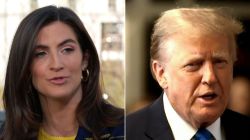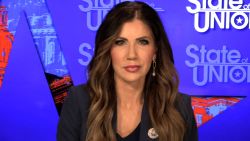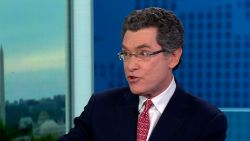The January 6 committee’s anticipated vote on Tuesday citing Steve Bannon for criminal contempt of Congress may be one of the last chances for lawmakers to seek meaningful consequences for former President Donald Trump’s attempt to effectively stage a coup.
After multiple and historic attempts to hold Trump to account for abuses of power – including two impeachments – failed to check his aberrant behavior, the rare move to try to enforce testimony from Bannon is intended to send a stern message to other allies of the former President whom the committee wants to question.
What is at stake is nothing less than the ability of a separate, co-equal branch of government to hold the presidency to account now and in future generations.
The inquiry became even more critical Monday, after Trump sued in District Court in Washington, DC, to keep secret records from his presidency that the Biden administration has declined to protect for him, rejecting his claims of executive privilege.
Lawyers for the former President, who refused to accept his free and fair election defeat and who incited a mob that invaded the US Capitol seeking to stop the certification of President Joe Biden’s victory, made the outlandish claim that the committee – rather than Trump – was “attempting to damage the republic itself and the citizens of the United States.”
It is far from the first time that the ex-President has sought to cover up his own behind-the-scenes behavior during the most flagrant challenge to US democracy of modern times.
His latest obstruction offensive raises the obvious question of what exactly Trump and his acolytes are trying to cover up about the attempt to prevent a peaceful transfer of power and to steal an election that he lost. But his suppression of information and flurries of legal action are also familiar after four years of an administration that refused any accountability and that made a mockery of Congress’ constitutional oversight duty.
The potential criminal contempt filing against Bannon is intended not just to force the firebrand prophet of Trump-style populism to testify about his conversations with the former President in the days around January 6. It’s a principled stand since Bannon’s refusal to show up after being subpoenaed would potentially create a precedent that would shatter Congress’ capacity to investigate any executive branch officials or othes, even those not related to Trump.
Democratic Rep. Adam Schiff of California told CNN on Sunday that the contempt filing was designed to prove the investigation has teeth, and as a warning to other witnesses tempted to bow to Trump’s efforts to scupper it.
“The fact that if the Justice Department prosecutes Steve Bannon, other witnesses will see they will face real consequences including jail time and potentially stiff fines. That is a way of getting people’s attention,” Schiff, a member of the select committee, told CNN’s Jim Acosta on “Newsroom.”
“Bannon’s an important witness in his own right, but it’s also important to send a message that the rule of law is back and people are going to need to pay attention.”
The immediate audience for that message is other key Trump associates who have been subpoenaed already. They include Kash Patel, a former senior Pentagon official; Mark Meadows, Trump’s final White House chief of staff; and Dan Scavino, former deputy chief of staff.
The January 6 panel is Democratic-led but includes two Republicans – Reps. Liz Cheney of Wyoming and Adam Kinzinger of Illinois – who broke ranks and condemned Trump’s behavior.
The committee was empaneled by House Speaker Nancy Pelosi after House and Senate Republican leaders, keen to ride Trump’s popularity with GOP base voters in the midterm elections, thwarted a bipartisan agreement for an independent commission into the insurrection. The Republican obstruction underscored how Congress’ capacity to investigate and restrain a wild presidency can be rendered very difficult when a party protects its own leader for partisan reasons and covers up his abuses of power.
When the committee votes to hold Bannon in criminal contempt, the full Democratic-controlled House will next have to follow suit and refer the matter to the US attorney for DC. Ultimately, it will be up to the Justice Department, under Attorney General Merrick Garland, to decide whether to prosecute.
Committee, White House dismiss Bannon claims
Setting the stage for Tuesday’s meeting, the committee sent a letter to Bannon’s lawyer that dismissed his claim that his conversations with Trump are covered by executive privilege. The protection is usually claimed by presidents to allow them to receive confidential advice from officials. But many legal experts view Bannon’s strategy as dubious since he left the White House in 2017 and had no formal role at the time of the insurrection. And committee members want to talk to Bannon about any contacts with organizers of the insurrection in January, quite apart from his talks with Trump. And while ex-presidents have some recourse to executive privilege, final adjudications are left to the sitting president if they disagree.
Bannon’s lawyer had previously argued that his client was not defying the committee but was simply complying with an instruction by Trump to go along with his effort to defend executive privilege. But the committee said in its letter that the ex-President had not communicated any assertion of privilege to the committee. And it described the notion that the concept protects Trump’s conversations with Bannon as “unsupported.”
And White House Deputy Counsel Jonathan Su wrote to Bannon attorney Robert Costello, saying that the Biden administration will not support his attempt to refuse to cooperate with the select committee on the grounds of executive privilege.
The showdown between Bannon and the committee has the potential to be the opening shot in a protracted legal battle that looks increasingly like a ruse to not just thwart the investigation but to delay its deliberations for as long as possible. If Republicans reclaim the House majority in next year’s congressional elections, a distinct possibility given the tough history of midterms for first-term presidents, a new GOP speaker in thrall to Trump would almost certainly shut down the investigation.
Biden White House
So turning enforcement requests from Congress into a parade of court hearings, judgments, appeals and obstruction tactics could not only infuriate the committee members, it could run out the clock for the committee itself.
With that in mind, Committee Chair Bennie Thompson, a Democrat from Mississippi, and Cheney, the panel’s vice chair, issued a joint statement on Monday evening warning they would fight any attempt by Trump to slow the process down.
“The former President’s clear objective is to stop the Select Committee from getting to the facts about January 6th and his lawsuit is nothing more than an attempt to delay and obstruct our probe. Precedent and law are on our side,” they wrote. “It’s hard to imagine a more compelling public interest than trying to get answers about an attack on our democracy and an attempt to overturn the results of an election.”
The unusual nature of the confrontation – over a former President exerting privilege on his own behalf even after he has left office – could also lead to a seminal constitutional argument about deference due to ex-presidents and the scope of executive privilege once they have left office.
An aggressive pro-Trump partisan like Bannon may also welcome the chance to turn the legal battle into a political cause célèbre. Conservatives who brand the entire effort as an attempt to victimize the ex-President got some unexpected help last week when Biden agreed that people who refuse subpoenas should face the consequences.
The comment broke with the President’s disciplined practice of avoiding any semblance of political interference with the Justice Department, which was repeatedly pressured by Trump to go along with his political vendettas. The department and the White House quickly vowed that decisions on Bannon and others would be approached purely on legal grounds. But the exchanges reflected the extreme pressure on Garland, who effectively holds the destiny of the January 6 probe in his hands.
There is also a question of whether the committee, once it has moved ahead with the Bannon criminal contempt citation, will go after other senior figures around the ex-President – and perhaps even Trump himself. Hauling a former president before the committee for a deposition would likely cause a spectacle and its members may not wish to create a precedent. Kinzinger, speaking on CNN’s “State of the Union” on Sunday, held out the prospect of action against Trump but recognized those constraints.
“If we subpoena all of a sudden the former President, we know that’s going to become kind of a circus so that’s not necessarily something we want to do up front,” the Illinois Republican said. “But if he has pieces of information we need, we certainly will.”
Trump raised his right hand and swore to tell the truth
In his filing to the DC District Court on Monday, the former President argued that committee requests for Trump-era documents currently held by the National Archives were too broad, included information subject to executive privilege and that the Presidential Records Act was unconstitutional. The suit also claims the committee subpoena has no legislative purpose. Lawmakers, however, say they need to investigate January 6 to see whether any new laws are necessary to stop anything similar from happening ever again.
Trump’s team lashed out at his successor in the court filing, calling Biden’s failure to protect the documents a “political ploy to accommodate his partisan allies.”
Another member of the committee, Rep. Zoe Lofgren – a veteran of the Watergate investigations – dismissed Trump’s suit.
“I don’t think it is well founded but the former President, we know, is someone who likes to sue a lot. He has engaged in frivolous lawsuits throughout his life,” the California Democrat told CNN’s Wolf Blitzer on “The Situation Room.”
But Trump did face a day in court – of a sort – on Monday. The former President answered questions for about four and a half hours in a deposition as part of a lawsuit brought by men alleging they were assaulted by his security team during a demonstration outside Trump Tower in New York in 2015.
“He answered the questions. Whether or not it was satisfactory, I think we will leave up to a jury in this matter,” Benjamin Dictor, attorney for the men who filed the 2015 lawsuit, told CNN’s Erin Burnett on Monday.
“He put his right hand in the air and he took an oath to tell the truth and that is the first time that that has happened since, well, before he was elected president. And that is a really meaningful thing.”
Paula Reid, Katelyn Polantz, Tierney Sneed, Marshall Cohen and Ryan Nobles contributed to this report.


















